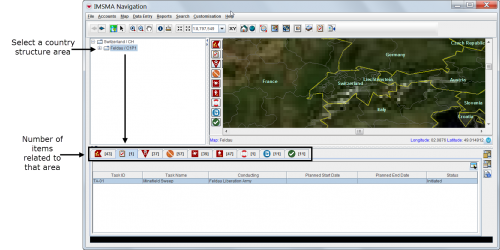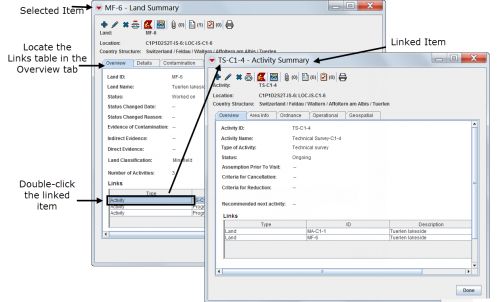Difference between revisions of "Viewing and Browsing in IMSMANG"
From IMSMA Wiki
(→Rearranging Displayed Items) |
|||
| Line 93: | Line 93: | ||
{{HowTo's | {{HowTo's | ||
| − | |[[ | + | |[[Select Display Columns]] |
}} | }} | ||
Revision as of 22:08, 30 June 2013
The IMSMA Navigation window immediately displays at the launch of the system.
The IMSMA Navigation Window has three panes: the Country Structure Pane, the Map Pane and the Items Pane. The three panes work together. Users can browse through elements of any pane to view additional data appropriate to the kind of data the other panes hold.
The items pane displays most recently approved information. Each item has its own summary window that can be opened to browse for linked information and historic details. Throughout IMSMANG, functions and features display in smaller windows over the IMSMA Navigation window.
Interacting with Panes
- Displaying items on the map
- 500px
| |
Items with a grey background in the items pane do not have geographic coordinates and they cannot be displayed on the map. |
- Identifying an item from the map
Viewing Additional Data on the Map
- Using the map tools
| |
Using the map tools activates the map status bar in the bottom of the IMSMA Navigation window. |
- Displaying items by subcategories
- 500px
- Displaying auxiliary data
- Displaying labels
Browsing the Items Pane
Rearranging Displayed Items
| How To |
|---|
Displaying New Column Headings
Viewing a Specific Item Summary Window
| How To |
|---|
| |
Summary windows can be customised and may present different tabs and summary headings. Contact your local administrator if you cannot find the links table. |
Viewing Linked Items of the Selected Item
| |
Links reflect the reconciliation steps performed before the approval of the selected item. For more details on reconciling and approving data, see Reconciling and Approving Data in IMSMANG. |
Viewing Historic Details
Browsing Locations
| How To |
|---|
Browsing Tasks
| |
Tasks do not display in summary windows. |
Viewing Auxiliary Data Lists
| How To |
|---|
- Choose Data entry > select an auxiliary data type.
| |
Lists of auxiliary data provide direct access for adding new data or editing existing data. |

